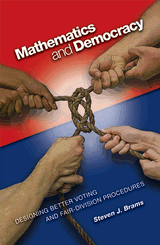 Source: Iain McLean, Science 31 October 2008: Vol. 322. no. 5902, pp. 680 - 681
Source: Iain McLean, Science 31 October 2008: Vol. 322. no. 5902, pp. 680 - 681This is a review of the book Mathematics and Democracy: Designing Better Voting and Fair-Division Procedures
"The world of social choice has been divided for 200 years between the Condorcet and Borda principles, named after their proponents........By the Condorcet principle, we should choose the candidate who beats all others in exhaustive pair-wise comparisons. The Borda principle chooses the candidate who on average scores highest. Both criteria sound reasonable, but they may yield different rankings and a Condorcet winner may not exist. (In that case, no matter which candidate is ranked highest, another would have won a simple majority vote against that candidate.)
"The Condorcet and Borda rules ask each voter to supply a full ranking (of preference or indifference) among all the candidates. So do proportional representation electoral systems. Approval voting asks for less. With it, each voter partitions the set of candidates into 'approved' and 'not approved' groups. The candidate(s) with the most approvals is (are) elected. Approval voting may be used to fill one or more seats........Approval voting does not throw away as much information as the U.S., Canadian, or British electoral systems, which merely ask voters to select one winner and elect the modal choice."
Comment: How does this book relate to the topic of this blog, "knowledge for development". I would suggest that there are some things we can not "know", and these include importantly, which public policy alternative is "best". The idea of maximizing utility is intellectually appealing, but I don't know of any examples where it has actually been implemented in practice. Democratic voting at least has the advantage that it may implement a social contract for the selection of alternatives. But, as the quoted paragraphs demonstrate, there are many ways to vote, and they can result in different choices. Often the choice of voting process, as in the U.S. system of presidential electors, is a compromise that no one likes and certainly is not designed to optimally represent the will of the people. JAD
No comments:
Post a Comment